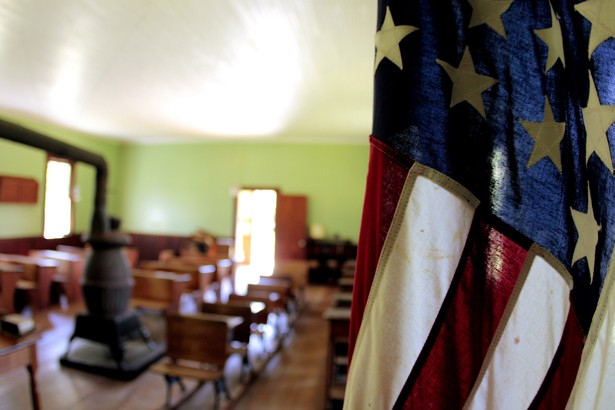On this 150th anniversary of the surrender at Appomattox, Americans mark the end of the Civil War. The questions at the heart of the war, though, still occupy the nation, which has never truly gotten over that conflict.
Read More
On this 150th anniversary of the surrender at Appomattox, Americans mark the end of the Civil War. The questions at the heart of the war, though, still occupy the nation, which has never truly gotten over that conflict.
Read MoreWho Should Decide How Students Learn About America’s Past?: Some politicians want to get rid of the AP U.S.-history curriculum because it paints a cynical picture of the country's backstory.
Read MoreLessons from the Past for Leadership Today at the CIC’s 2015 Presidents Institute
Read MoreDavid Blight sat down with Greg Grandin, Professor of History at New York University, to discuss Grandin's recent book The Empire of Necessity: Slavery, Freedom, and Deception in the New World.
Read MoreIn this video, President Chase Robinson of the Graduate Center introduces the conference, and David W. Blight of Yale University gives the keynote address, on October 17, 2014, in Elebash Recital Hall.
Read MoreWhy can’t we just get over the Civil War in America?
Read More"A pencil drawing and a grainy photo in the Library of Congress are all that is left of the cemetery where 257 Union soldiers were buried after the Civil War on what had been a race course in Charleston, South Carolina.
Read MoreIT MUST have been quite a sight, Memorial Day 1869 in Cincinnati, where “a crowd of thirty thousand gathered in a cemetery to observe the decoration of 745 graves of that community’s war dead,” as the historian David W. Blight describes it. “Among the processions was a disciplined line of hundreds of women, all dressed in ‘purest white’ and carrying baskets of flowers. At a signal, each woman stepped forward and cast her flowers on a grave. The scale of such an event would dwarf an All Saints Day procession in some European cities.” ...
David Blight, author of Race and Reunion: The Civil War in American Memory, talked about his book and responded to viewer questions.
Read MoreCivil War author and historian David Blight talks about the career and influence of one of his predecessors in the field, Bruce Catton. From the 1950s to the 1970s, Catton researched and wrote several books about the Civil War, including the 1954 Pulitzer Prize-winning A Stillness at Appomattox. The Civil War Institute at Gettysburg College hosted this event.
Read MoreAugust 28th marks the 50th anniversary of the Rev. Martin Luther King, Jr.’s famous speech in front of the Lincoln memorial in Washington, D.C., when, at the close of the March on Washington, he spoke of his dream for racial harmony and economic equality in America.
Read MorePhoto Credit: Civil War remains Nicholas Kamm/AFP/Getty Images
Historian David Blight speaks at the Minnesota Historical Society's History Forum about the ways the Civil War has influenced American history and its society and people in the 150 years since.
Read MoreOne hundred fifty years ago, Abraham Lincoln emancipated the slaves. Just how he got there might surprise you.
Read MoreThe Gilder Lehrman Institute of American History, http://www.gilderlehrman.org/, presents historian David Blight on a meeting between abolitionist leader Frederick Douglass and Abraham Lincoln.
Read MoreJames Oakes and John Witt talked about their books on the process of Emancipation during the Civil War. James Oakes argued that contrary to conventional narratives, the destruction of slavery was a Republican goal from the beginning of the war. John Witt spoke about the world’s first pamphlet style “laws of war” code written by Lincoln advisor and legal scholar Francis Lieber in 1862 and 1863. Witt argued that the “Lieber Code” was written to help justify emancipation as a military necessity, and that the code has been a source for international laws of war ever since. The discussion was moderated by David Blight.
From Days of Mourning to Days of Jubilee? Frederick Douglass and the Meaning of the Civil War
Read MoreAn OAH Distinguished Lecture by David Blight, Class of 1954 Professor of American History and director of the Gilder Lehrman Center at Yale University.
Read MoreScholars talked about the contributions, sacrifices, and challenges faced by African Americans who served in the U.S. Colored Troops during the Civil War.
Read MoreCivil War author and historian David Blight talks about the career and influence of one of his predecessors in the field, Bruce Catton.
Read MoreFamed Yale Civil War historian David Blight looks at Uriah Parmelee, a Yale student who joined the Union Army to fight for the abolition of slavery.
Read More